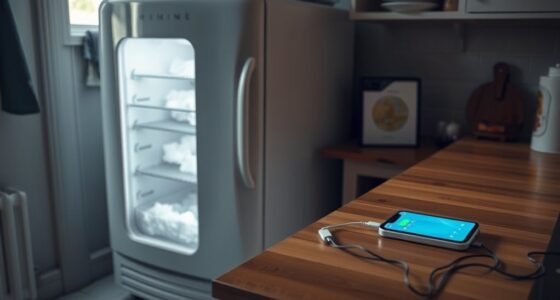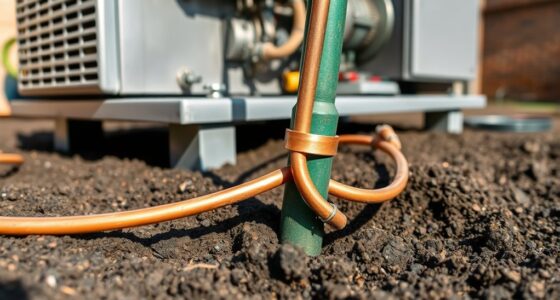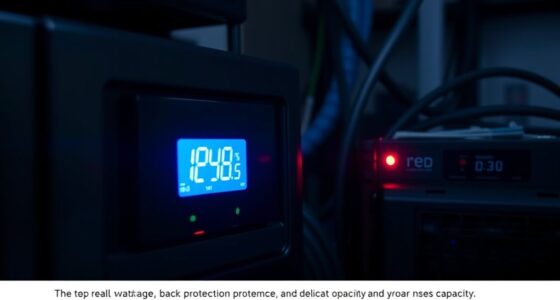A home UPS provides instant backup for essential electronics like computers, routers, and medical devices by quickly switching to battery power during outages. However, it can’t support high-power appliances such as refrigerators or HVAC systems for long periods. Its capacity limits how many devices and how long they can run, and batteries need regular maintenance. To discover how to maximize your backup options and avoid common pitfalls, keep exploring this guide.
Key Takeaways
- Home UPS systems provide instant backup power for small electronics during outages, but can’t support high-power appliances like refrigerators.
- They rely on batteries with limited capacity, offering only minutes to an hour of backup depending on load.
- UPS units protect against voltage spikes and surges, but do not extend runtime or support continuous operation.
- They are silent, suitable for indoor use, and require regular battery maintenance for reliable performance.
- UPS systems are ideal for computers, routers, and medical devices, but not meant for long-term power supply like generators.
How UPS Systems Provide Backup Power
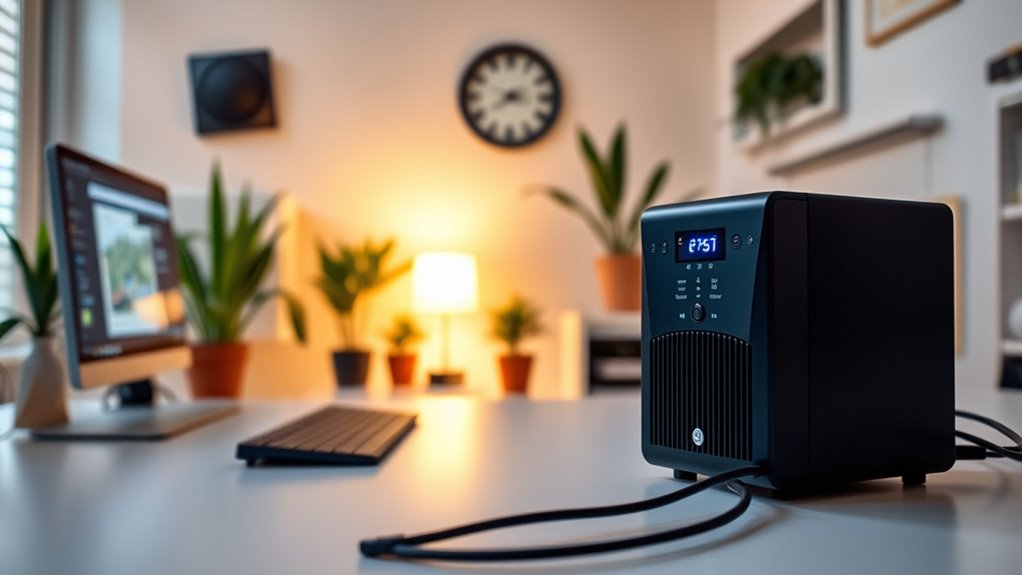
UPS systems provide backup power by continuously monitoring your home’s electricity, ready to step in when the main supply falters. They rely on advanced battery technology to store energy, ensuring that power remains consistent during outages. When a power cut occurs, the UPS instantly switches to battery mode, delivering electricity to your devices without interruption. This seamless shift is essential for protecting sensitive electronics from sudden shutdowns. Additionally, a UPS offers surge protection, shielding your devices from voltage spikes that could cause damage. The combination of reliable battery technology and surge protection makes UPS systems essential for maintaining power stability and safeguarding your electronics during power fluctuations or outages. Proper installation and maintenance are key to ensuring your UPS functions effectively and reliably when needed. Regularly checking the battery health can help prevent unexpected failures and ensure your system is ready when you need it most. Staying informed about battery technologies can help you choose the most efficient and durable UPS options for your home. Moreover, understanding power management strategies can optimize your UPS’s performance and lifespan, keeping your home connected and protected, no matter what happens to the main power grid. Being aware of battery replacement procedures can also extend the longevity of your UPS system and prevent unexpected downtime.
The Types of Devices a Home UPS Can Support

A home UPS can support a variety of essential devices, helping you stay connected and protected during power interruptions. Typically, your UPS is suitable for smaller electronics like computers, routers, modems, and medical devices. The type of battery inside, such as sealed lead-acid or lithium-ion, influences how long your devices can run and how quickly the UPS responds. Many units also include surge protection, shielding your devices from voltage spikes that can cause damage. Keep in mind that a UPS isn’t meant for high-power appliances like refrigerators or HVAC systems. Instead, focus on critical electronics that need continuous power. Choosing the right battery type and ensuring your UPS has effective surge protection will maximize your device’s safety and performance during outages. Additionally, understanding best airless paint sprayers can help you select the right equipment for your painting projects. For optimal performance, selecting a UPS with adequate power capacity ensures your devices stay operational during longer outages. Proper UPS placement within your home setup also helps in maintaining consistent performance and easy access when needed.
Power Capacity and Runtime Limitations
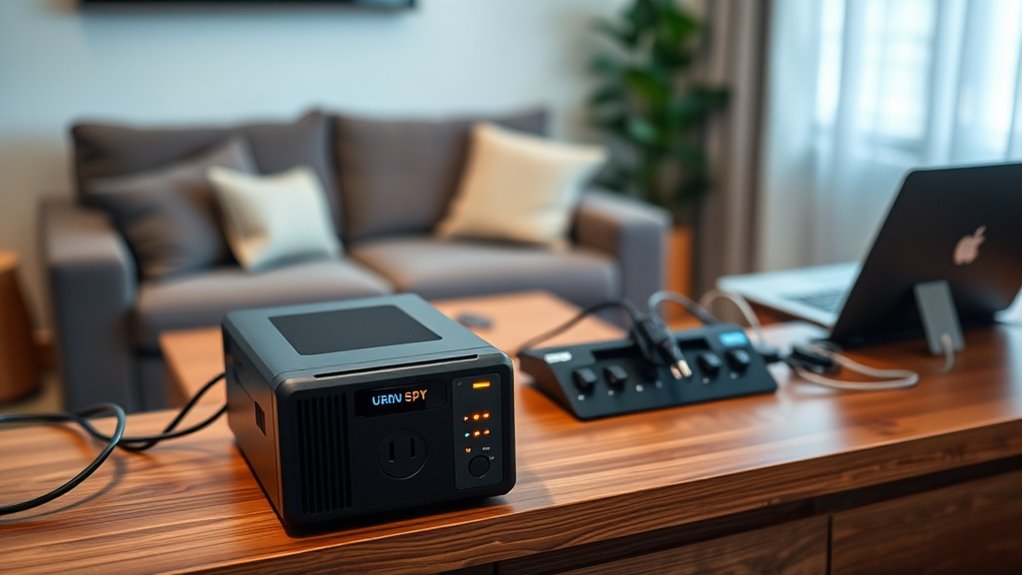
Your home’s UPS has limits on how much power it can provide at once, which affects what devices you can run during an outage. Understanding these capacity constraints helps you choose the right unit for your needs. Keep in mind that runtime can vary based on the load you connect, so expectations should be realistic. Additionally, considering essential oils for respiratory health can promote a more comfortable environment during power outages. Recognizing power capacity limitations ensures you select an appropriately sized UPS to prevent overloading and protect your equipment. Being aware of battery runtime can help you plan how long your devices will remain operational during an outage. Proper understanding of teas and their benefits can also help create a calming environment during unexpected power interruptions.
Capacity Constraints
While a home UPS can protect your devices during power outages, its capacity is limited by both power and runtime constraints. The battery capacity determines how long your devices stay powered, but it’s finite. Larger devices or multiple gadgets can quickly drain the UPS, reducing runtime. Surge protection helps guard against voltage spikes, but it doesn’t extend runtime or increase power capacity. Additionally, the dog breed that the UPS is designed for can influence its effectiveness in supporting certain devices. Being aware of capacity constraints ensures realistic expectations for your backup power system. Understanding power limitations and how they affect your setup can help optimize your backup strategy. Recognizing device compatibility is also essential to ensure your UPS can support your essential electronics effectively. Moreover, considering the load capacity of your UPS helps in selecting the appropriate model for your needs.
Runtime Expectations
Ever wondered how long your home UPS can keep your devices running during an outage? Your runtime depends on the UPS’s power capacity and the load you connect. Typically, a UPS provides a limited backup time—often just enough to save your work and shut down safely. Keep in mind, battery lifespan impacts how well your UPS performs over time; batteries degrade with each cycle, reducing runtime. Surge protection is also essential, as it shields your devices from sudden power spikes during outages or fluctuations. While some models offer longer runtimes, they usually come with higher costs and size. To maximize your UPS’s effectiveness, avoid overloading it and perform regular maintenance to ensure the batteries remain healthy. Additionally, understanding battery lifespan factors can help you plan for emergencies more effectively in your home environment. Proper UPS placement can also help optimize your setup by reducing interference and ensuring easy access for maintenance. Considering power capacity and runtime limitations can help you select the right UPS for your needs, ensuring reliable backup when you need it most. This way, you get reliable backup when you need it most, and incorporating home decor considerations such as proper placement can also help optimize your UPS setup.
The Difference Between UPS and Generators
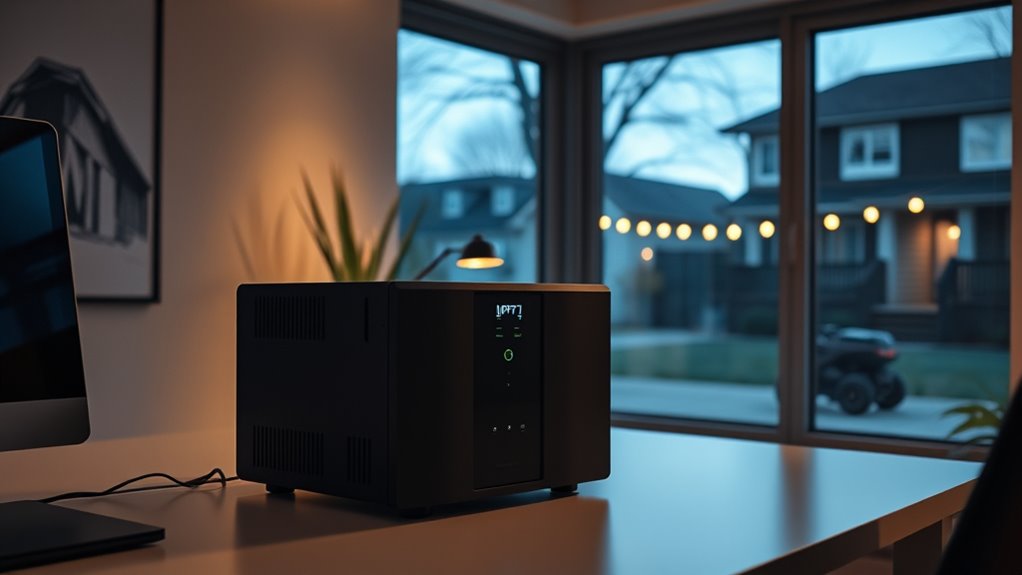
Unlike generators, UPS systems provide instant backup without long startup times, but their power supply duration is limited. Generators can run for hours, though they tend to be noisier and require regular maintenance. Understanding these differences helps you choose the right backup for your home needs. Home energy solutions play a crucial role in maintaining your daily routine during power outages. Additionally, many retail hours like those of hardware stores can help you find the necessary supplies for installation or maintenance. To ensure reliable performance, selecting the appropriate paint sprayer for your projects is essential.
Power Supply Duration
Power supply duration is one of the key differences between UPS systems and generators. A UPS provides immediate backup power, typically lasting from a few minutes to an hour, enough to save your work and shut down safely. Its battery lifespan determines how long it can deliver power before needing replacement. Unlike generators, which can run for hours or days depending on fuel, a UPS’s runtime is limited. Additionally, a UPS offers surge protection, safeguarding your devices from voltage spikes during outages. This quick, reliable power backup is ideal for short-term disruptions, but it’s not meant for extended outages. If you need long-lasting power, you’ll still require a generator. Understanding these differences helps you choose the right solution for your home.
Noise and Maintenance
While UPS systems are compact and quiet, generators tend to be much noisier and require regular maintenance. You’ll notice that noise levels differ considerably: UPS units produce minimal sound, making them suitable for home use without disturbance. In contrast, generators generate loud engine noise, which can be disruptive. Maintenance frequency also varies: UPS systems need little upkeep, mainly occasional battery checks. Generators demand more attention, including oil changes, filter replacements, and regular inspections.
- UPS systems operate silently, ideal for indoor environments
- Generators produce loud noise, best kept outdoors
- UPS maintenance is infrequent, while generators need ongoing care
Understanding these differences helps you decide what fits your needs and lifestyle.
Proper Usage and Maintenance of Home UPS Units

To guarantee your home UPS unit functions reliably and lasts longer, proper usage and regular maintenance are essential. Start by monitoring your battery lifespan, as batteries degrade over time and need replacement to maintain efficiency. Make certain the UPS is placed in a cool, dry location away from direct sunlight and heat sources, which can affect performance and battery health. Avoid placing it near dust, moisture, or in areas with high humidity. Regularly check the connections and clean dust from vents to prevent overheating. Test the unit periodically by simulating power outages, and follow the manufacturer’s guidelines for battery replacement and servicing. Proper placement considerations and consistent upkeep will optimize your UPS’s performance and extend its lifespan.
Common Misconceptions About UPS Capabilities

Many people overestimate what home UPS systems can do, leading to misconceptions about their capabilities. You might think a UPS will keep all your devices running indefinitely or protect against every power issue. In reality, a UPS provides limited backup time and mainly safeguards against power outages and surges. It’s important to understand that:
- Battery lifespan varies and will eventually require replacement.
- Surge protection is limited to voltage spikes; it doesn’t prevent all electrical issues.
- UPS units aren’t designed to support high-power appliances continuously.
Believing a UPS can do more than it’s built for can lead to disappointment. Knowing its actual capabilities helps you use it effectively and maintain its performance over time.
Tips for Choosing the Right UPS for Your Home
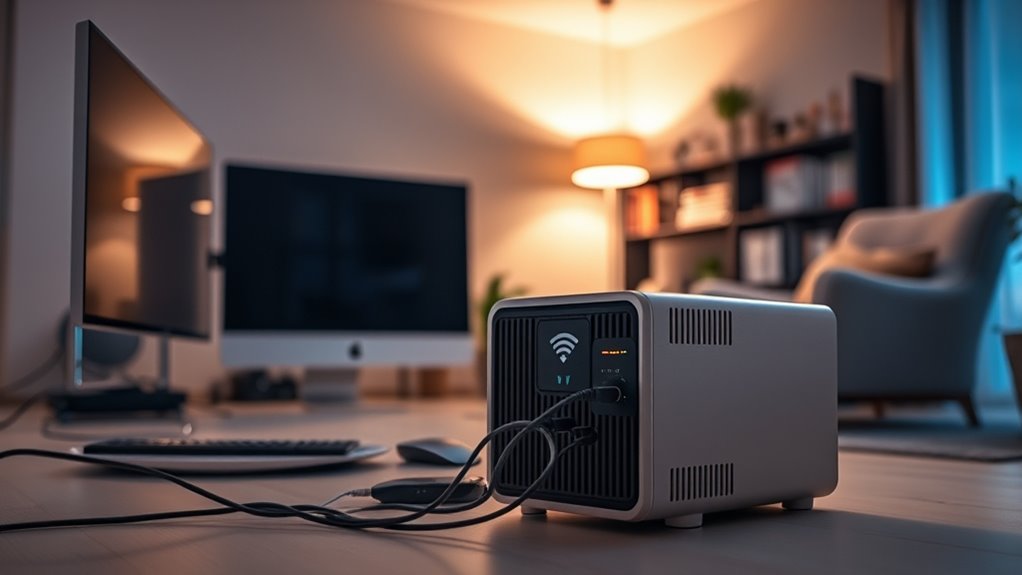
Choosing the right UPS for your home starts with evaluating your power needs and identifying the devices you want to protect. Consider the total wattage of your essential electronics, like computers, routers, and home security systems, to select a UPS with adequate capacity. Pay attention to battery lifespan, as batteries degrade over time and impact backup duration; choosing models with longer-lasting batteries can save you headaches later. Surge protection is also vital—ensure your UPS offers reliable surge suppression to guard against power spikes that can damage your devices. Look for features like automatic voltage regulation (AVR) and easy battery replacement. By carefully assessing these factors, you’ll choose a UPS that provides dependable backup and protection tailored to your home’s needs.
Frequently Asked Questions
Can a UPS Protect Against Power Surges and Voltage Fluctuations?
A UPS can protect against power surges and voltage fluctuations if it includes surge protection and voltage regulation features. It acts as a barrier, absorbing sudden voltage spikes and stabilizing fluctuating power. However, not all UPS systems offer these protections, so check your model’s specifications. You need surge protection to prevent damage from surges and voltage regulation to maintain consistent power, ensuring your devices stay safe during power irregularities.
How Long Can a Typical Home UPS Run During an Outage?
Imagine a lifeline in the storm—your home UPS. Typically, it provides backup duration of 15 minutes to a couple of hours, depending on battery life and load. Small devices like routers and lights may run longer, while larger appliances drain the battery faster. Your UPS’s backup duration is crucial during outages, giving you precious time to save work or shut down safely. Keep in mind, battery life ultimately determines how long your system can keep you connected.
Are All Devices Compatible With Home UPS Systems?
Not all devices are compatible with home UPS systems. You need to check device compatibility before connecting. Sensitive electronics like computers and routers usually work well, but some appliances may not be supported due to power requirements. Additionally, keep in mind that battery replacement is essential when the UPS’s backup time diminishes. Regularly maintaining your UPS guarantees it continues to protect your devices effectively during outages.
What Maintenance Is Required to Keep a UPS Functioning Properly?
Sure, keeping your UPS happy takes minimal effort—just like a high-maintenance pet. You’ll want to regularly check the battery, replacing it when it’s dead or weak, and dust it off to prevent overheating. Don’t forget, ignoring these simple tasks can turn your reliable backup into a paperweight. So, stay proactive: swap batteries as needed and keep it dust-free, and your UPS will serve you well for years.
Can a UPS Support Multiple High-Power Appliances Simultaneously?
A UPS can support multiple high-power appliances simultaneously if your total power load stays within its capacity. You need to check the UPS’s wattage rating and confirm all connected appliances are compatible. Overloading it can cause failure or shutdowns. To keep everything running smoothly, prioritize essential devices and avoid plugging in appliances that draw more power than your UPS can handle.
Conclusion
Remember, a home UPS provides backup power for essential devices during outages, but it doesn’t substitute a generator for long-term needs. Many believe UPS units can run everything indefinitely, but they have limited capacity and runtime. By understanding their true capabilities and maintaining your UPS properly, you’ll ensure reliable protection without false expectations. Ultimately, choosing the right UPS means balancing your power needs with its limitations—so you stay connected when it matters most.


